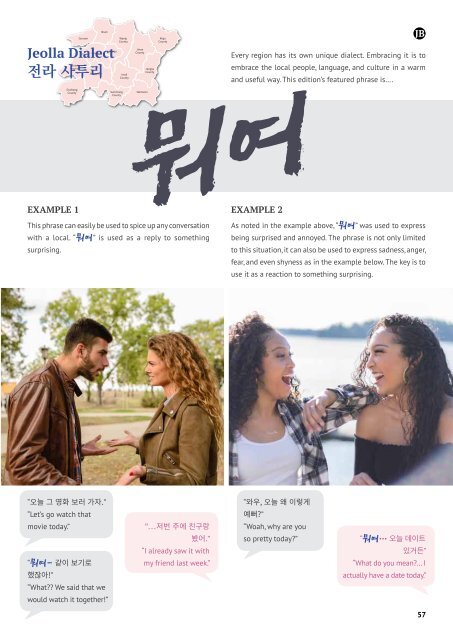You also want an ePaper? Increase the reach of your titles
YUMPU automatically turns print PDFs into web optimized ePapers that Google loves.
Iksan<br />
Gunsan<br />
Wanju<br />
County<br />
Jeolla Dialect<br />
Jeonju<br />
Gimje<br />
전라 사투리<br />
Buan<br />
County<br />
Jeongeup<br />
Imsil<br />
County<br />
Gochang<br />
County<br />
Sunchang<br />
County<br />
Example 1<br />
Jinan<br />
County<br />
Namwon<br />
This phrase can easily be used to spice up any conversation<br />
with a local. “뭐여” is used as a reply to something<br />
surprising.<br />
Jangsu<br />
County<br />
Muju<br />
County<br />
뭐여<br />
Every region has its own unique dialect. Embracing it is to<br />
embrace the local people, language, and culture in a warm<br />
and useful way. This edition’s featured phrase is….<br />
Example 2<br />
As noted in the example above, “뭐여” was used to express<br />
being surprised and annoyed. The phrase is not only limited<br />
to this situation, it can also be used to express sadness, anger,<br />
fear, and even shyness as in the example below. The key is to<br />
use it as a reaction to something surprising.<br />
“오늘 그 영화 보러 가자.”<br />
“와우, 오늘 왜 이렇게<br />
“Let’s go watch that<br />
예뻐?”<br />
movie today.”<br />
“…저번 주에 친구랑<br />
“Woah, why are you<br />
“뭐여- 같이 보기로<br />
했잖아!”<br />
봤어.”<br />
“I already saw it with<br />
my friend last week.”<br />
so pretty today?”<br />
“뭐여… 오늘 데이트<br />
있거든”<br />
“What do you mean?... I<br />
actually have a date today.”<br />
“What?? We said that we<br />
would watch it together!”<br />
57















